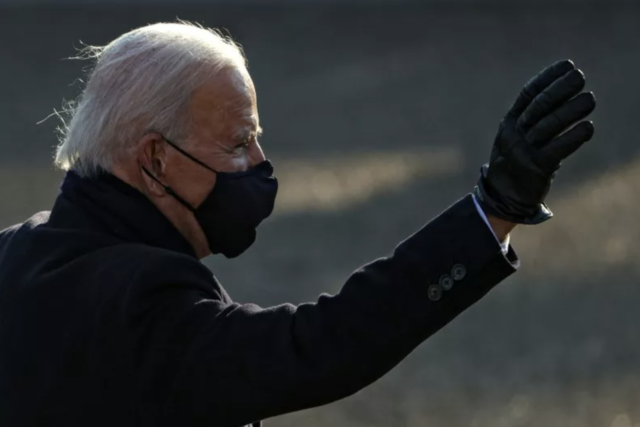
One of the “raps” on American foreign policy is that when presidents change, policy changes—and when the parties and power structures in Washington change, neither allies nor adversaries have a good grasp of what’s coming next. This criticism is often right, of course, so it would be helpful for the Biden administration to consider retaining some worthwhile policies of its predecessor.
It’s not as if they can’t. On Inauguration Day, the State Department hosted a Twitter account for the “U.S. Ambassador to Israel, the West Bank and Gaza.” It didn’t last long. After a report by Adam Kredo at The Washington Free Beacon, the account restored its previous title.
Let’s begin with the Middle East, where there is a lot to consider building on. The region has broadly reassessed its security and economic needs. Decades of posturing for war against Israel have ended and the Abraham Accords are broadly accepted even by countries that have not signed them. The U.S. moved from the untenable position of “neutral party” between Israel—which is our democratic ally—and the Palestinian Authority—which is not—to the more appropriate role of honest broker. U.S.-Israel security cooperation, grounded in common values, must continue whether Israel is in EUCOM or, as it is currently slated to do, moves to CENTCOM.
Far from abandoning the Palestinians, U.S. policy has kept a seat at the table for them while requiring basic partner-like behavior, including respect for human rights, financial and political transparency, the end of incitement against Israel (the ostensible “partner”), halting financial compensation to terrorists and eliminating Hamas and Palestinian Islamic Jihad.
Cooperating with Israel, maintaining the Abraham Accords and holding the Palestinian leadership to standards of responsible behavior should remain essential elements of Biden administration policy.
The malign terrorist machinations of Iran were, in large measure, what led Arab and African countries to reevaluate their relations with Israel. The Obama administration’s attempt to “win” Iran into civilized behavior led to the JCPOA, which created a legal pathway for the Tehran regime to achieve nuclear weapons capability even if it hadn’t cheated. And it did cheat. On everything.
Documents uncovered by Israel in 2018 showed that Iran was still working on its nuclear weapons program as late as 2009. Thus, approaching the JCPOA, Iran provided the “P5+1” nations and the International Atomic Energy Agency (IAEA) with a faulty baseline for its nuclear activities. Following the deal, the regime failed to permit required inspections at nuclear facilities and failed to make the changes necessary in the Fordow plant to bring it in line with IAEA specifications. And IAEA says so.
American withdrawal from the JCPOA, the dispatch of Qassem Soleimani, restoration of sanctions on Iran with a strong path for humanitarian aid for the people and the determination to help Iraq assert its independence were all important. They should be the foundation of the Biden administration’s Iran policy.
No less a Biden supporter than Jackson Diehl of The Washington Post noted this week,
Obama argued that U.S. “engagement” with adversarial regimes could diminish their hostility and even cause them to liberalize internally…. Obama tried out this doctrine on Myanmar (or Burma) and Cuba, as well as Iran. The results were pretty dismal…. The logical response to these failures would be a more realistic, hard-nosed appreciation of the challenges posed by U.S. adversaries—including China and Russia, as well as smaller fries such as Iran and Cuba. They must be dealt with…but illusions about their regimes’ potential for positive evolution through U.S. suasion should be abandoned.
A sound thought on Iran—and on China and Russia. Here, too, the Biden administration can strengthen existing policies.
To some degree—though perhaps not enough—NATO has accepted the challenge of defending itself in Europe, and its members have increased spending on their own defense as well as redistributing the financial burden. A priority for President Biden should be to protest the arrest of Russian dissident Alexei Navalny, which happened upon his return to Russia after the Putin government poisoned him. Then, Mr. Biden should demand that the EU not only join our protest, but exercise its leverage to make Russia pay. The prior administration opposed finishing the Nord Stream II pipeline from Russia to Europe. Mr. Biden should continue that opposition—strongly suggesting to Europe’s leadership that it reject mortgaging Europe’s energy future to Moscow. It would be a principled American position.
The EU, which just signed a China-friendly trade pact with Beijing, appears not to be much interested in the security implications of its financial dealings. That is not new, but it should be a concern for President Biden, particularly as it relates to China. Outrage over the crushing of democracy in Hong Kong and Beijing’s genocide of Uighurs in Xinjiang, if articulated by Secretary of State-designate Antony Blinken, would be a meaningful continuation of the position of former secretary Mike Pompeo.
The U.S. defense budget, which had declined precipitously under Obama-era “sequestration,” has risen and readiness has been vastly improved. The next focus should be on R&D for future battles. The State Department’s Clean Network Initiative has been effective at reducing the role of China in high-speed telecommunications around the globe. It should be vigorously supported and expanded as we learn more about China’s cyber spying activities, attempts to infiltrate Western defense technology and theft of technology that goes straight into the Chinese military under the guise of “academic research.” Arrangements allowing domestic rare earth element mining to reduce reliance on China for minerals essential to weapons development and production should be enhanced.
A lot does change when America changes administrations, but its fundamental interests remain the same. Both our friends and our adversaries should understand that.





